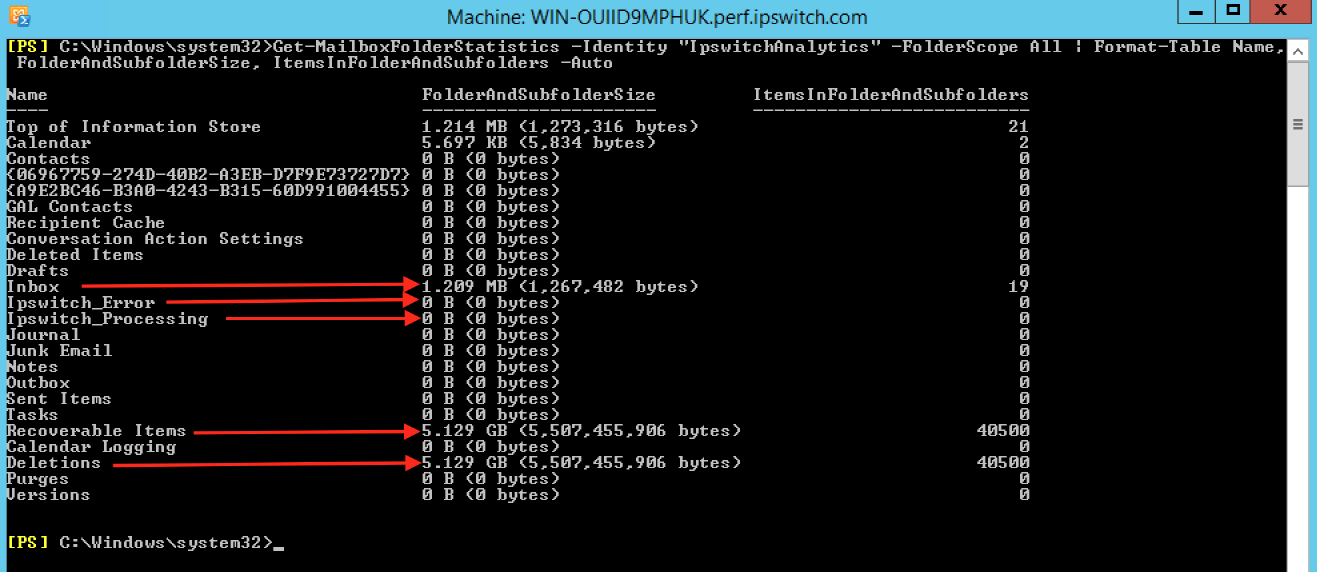How the Ipswitch Analytics Exchange Mailbox folders are used by Ipswitch Analytics Exchange Support.
The Ipswitch Analytics Exchange Transport Rule is responsible for identifying emails that match its configured conditions. When one is identified, the Transport Rule creates an Exchange Incident Report and places it in the Ipswitch Analytics Exchange Mailbox Inbox folder. The Ipswitch Analytics Exchange Agent looks for items to process in the Inbox folder.
When the Ipswitch Analytics Exchange Agent connects and discovers items in the Inbox folder, it moves a number of them into the Ipswitch_Processing folder. Items in this folder are processed and their associated email attachment-based file transfer metadata is submitted to the Ipswitch Analytics Server. After the metadata is submitted, the Ipswitch Analytics Exchange Agent deletes the processed items from the Ipswitch_Processing folder. Any items that cause a processing error are moved to the Ipswitch_Error folder.
When items are permanently deleted from an Exchange Mailbox they are moved to a hidden Recoverable Items folder. This is where Exchange 2013 keeps permanently deleted items until the deleted item retention period is reached. The Microsoft Exchange 2013 Mailbox Assistant background process is responsible for removing items from Recoverable Items. After items are deleted from the Recoverable Items folder, they are physically deleted from the system and no longer take up space in the Mailbox Database.
Get-MailboxFolderStatistics "IpswitchAnalytics" -FolderScope All | Format-Table Name, FolderAndSubfolderSize, ItemsInFolderAndSubfolders -Auto
Example
The example shows the mailbox folder statistics for the Ipswitch Analytics Exchange Mailbox. It indicates a healthy Ipswitch Analytics Exchange system.

Deleted Items Retention
The Ipswitch Analytics Exchange Mailbox must have the Deleted Items Retention set to '0' days. This informs the Microsoft Exchange 2013 Folder Assistant to remove all items in the Recoverable Items folder each time it processes the Ipswitch Analytics Exchange Mailbox.
Get-Mailbox "IpswitchAnalytics" | Format-List -Property RetainDeletedItemsFor
Example: The figure shows that the Ipswitch Analytics Exchange Mailbox is correctly configured to retain deleted items for 0 days.

The Mailbox Assistant Schedule
Your Exchange deployment's Microsoft Exchange 2013 Mailbox Assistant schedule plays an important part in ensuring that the Ipswitch Analytics Exchange Mailbox stays below its storage capacity configurations. If the Recoverable Items folder reaches its configured capacity, Exchange 2013 will prevent the Ipswitch Analytics Exchange Agent from deleting processed items from the Ipswitch_Processing folder. The inability to move items out of the Ipswitch_Processing folder will prevent the Ipswitch Analytics Exchange Agent from reducing the items in the Mailbox. This will result in items collecting in the Inbox folder. If the Ipswitch Analytics Exchange Mailbox reaches the configured 'Inbox' quota Exchange will reject new items destined for the Ipswitch Analytics Exchange Mailbox. These rejected items will be lost.
The default Microsoft Exchange 2013 Mailbox Assistant schedule is set to one day.
In Exchange 2013, the Managed Folder Assistant is a throttle-based assistant. Throttle-based assistants are always running and don't need to be scheduled. The system resources they can consume are throttled. You can configure the Managed Folder Assistant to process all mailboxes on a Mailbox server within a certain period (known as a work cycle). The work cycle is set to one day by default. Reference: Microsoft TechNet.
ManagedFolderWorkCycle configurationGet-MailboxServer | Format-Table Name,ManagedFolderWorkCycle* -Auto
Example: The figure shows that the Microsoft Exchange 2013 Mailbox Assistant is configured to process all mailboxes within one day.
Red arrow: Managed Folder WorkCycle configured to process all mailboxes on this Mailbox Server within 1 day.

Server-Wide Configuration
The ManagedFolderWorkCycle configuration is an Exchange Mailbox Server-wide configuration.
Caution: Adjusting the ManagedFolderWorkCycle configuration for the Ipswitch Analytics Exchange Mailbox will affect other Exchange Mailboxes hosted on the Exchange Mailbox Server. Doing so is not recommended.
The Microsoft Exchange 2013 Mailbox Assistant can run on a specific Mailbox by executing the Start-ManagedFolderAssistant cmdlet. If you need the Microsoft Exchange 2013 Mailbox Assistant to run more frequently for the Ipswitch Analytics Exchange Mailbox, consider scheduling the Start-ManagedFolderAssistant cmdlet with Windows Scheduler.
Start-ManagedFolderAssistant "IpswitchAnalytics"
Example: The figure shows the mailbox folder statistics for the Ipswitch Analytics Exchange Mailbox after running Start-ManagedFolderAssistant for the Ipswitch Analytics Exchange Mailbox.
Red arrows indicate the Recoverable Items and Deletions.
